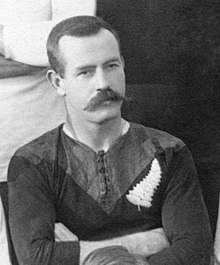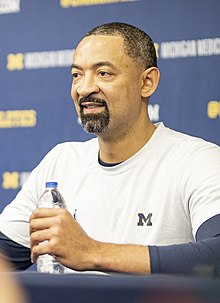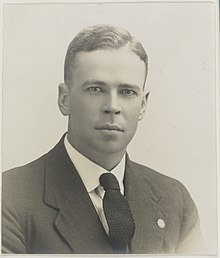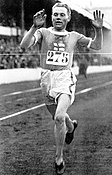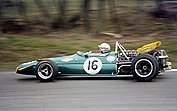Portal:Sports
The Sports Portal

Sport is a form of physical activity or game. Often competitive and organized, sports use, maintain, or improve physical ability and skills. They also provide enjoyment to participants and, in some cases, entertainment to spectators. Many sports exist, with different participant numbers, some are done by a single person with others being done by hundreds. Most sports take place either in teams or competing as individuals. Some sports allow a "tie" or "draw", in which there is no single winner; others provide tie-breaking methods to ensure one winner. A number of contests may be arranged in a tournament format, producing a champion. Many sports leagues make an annual champion by arranging games in a regular sports season, followed in some cases by playoffs.
Sport is generally recognised as system of activities based in physical athleticism or physical dexterity, with major competitions admitting only sports meeting this definition. Some organisations, such as the Council of Europe, preclude activities without any physical element from classification as sports. However, a number of competitive, but non-physical, activities claim recognition as mind sports. The International Olympic Committee who oversee the Olympic Games recognises both chess and bridge as sports. SportAccord, the international sports federation association, recognises five non-physical sports: bridge, chess, draughts, Go and xiangqi. However, they limit the number of mind games which can be admitted as sports. Sport is usually governed by a set of rules or customs, which serve to ensure fair competition. Winning can be determined by physical events such as scoring goals or crossing a line first. It can also be determined by judges who are scoring elements of the sporting performance, including objective or subjective measures such as technical performance or artistic impression. (Full article...)
Selected articles
Selected pictures
Did you know...
- ...that Vulcana was a Welsh strongwoman who traveled the world with her husband, performing as The Atlas and Vulcana Group of Society Athletes?
- ...that Julien Wiener is the only Jewish Australian Test cricketer?
- ...that a cousin of curling, ice stock sport (pictured), is played primarily in Germany and Austria?
- ...that Ohio State linebacker James Laurinaitis, the son of professional wrestler Road Warrior Animal, is the first Buckeyes scholarship football player from Minnesota since 1933?
- ...that the longest NHL overtime game in the history of hockey was a 1936 match between the Detroit Red Wings and the Montreal Maroons?
Selected quote
Selected athlete
In the 1920 Summer Olympics Nurmi took the silver medal in the 5,000 m and the gold in the 10,000 m and the cross country events. In 1923, Nurmi became the first, and so far only, runner to hold the mile, the 5,000 m and the 10,000 m world records at the same time. He went on to set new world records for the 1,500 m and the 5,000 m with just an hour between the races, and take gold medals in the distances in less than two hours at the 1924 Olympics. Nurmi won all his races and returned home with five gold medals, but embittered, as Finnish officials had refused to enter him for the 10,000 m.
At the 1928 Summer Olympics, Nurmi recaptured the 10,000 m title but was beaten to the gold in the 5,000 m and the 3,000 m steeplechase. He then turned his attention to longer distances, breaking the world records for events such as the one hour run and the 25-mile marathon. Nurmi intended to end his career on a marathon gold medal.
In a controversial case that strained Finland–Sweden relations and sparked an inter-IAAF battle, Nurmi was suspended before the 1932 Games by an IAAF council that questioned his amateur status. Although he was never declared a professional, Nurmi's suspension became definite in 1934 and he retired from running.
Nurmi, who rarely ran without a stopwatch in his hand, has been credited for introducing the "even pace" strategy and analytic approach to running, and for making running a major international sport. (Full article...)
Selected team
In the 1960s, Brabham was the world's largest manufacturer of open wheel racing cars for sale to customer teams, and had built more than 500 cars by 1970. During this period, teams using Brabham cars won championships in Formula Two and Formula Three. Brabham cars also competed in the Indianapolis 500 and in Formula 5000 racing. In the 1970s and 1980s, Brabham introduced innovations such as the Gordon Murray designed "fan car"—which won its only race before being withdrawn.. The team won two more Formula One drivers' championships in the 1980s with Brazilian Nelson Piquet. He won his first championship in 1981 in the Ground effects BT49-Ford, and became the first to win a drivers' championship with a turbocharged car in 1983. In 1983 the Brabham BT52, driven by Piquet and Italian Riccardo Patrese, was powered by the BMW M12 Straight-4 engine, and powered Brabham to four of the team's 35 Grand Prix victories.
Midway through the 1992 season, the team collapsed financially as its owner was unable to make repayments against loans. The case was investigated by the United Kingdom Serious Fraud Office. In 2009, an unsuccessful attempt was made by a German organisation to enter the 2010 Formula One season using the Brabham name. (Full article...)
In this month
- April 6, 1896 – The first international Olympic Games held in the modern era, the 1896 Summer Olympics (pictured), begin
- April 8, 2005 – The inaugural Islamic Solidarity Games open in Mecca, Saudi Arabia
- April 14, 1900 – Union Cycliste Internationale, the world governing body for sports cycling, is founded in Paris, France
- April 19, 1897 – The first Boston Marathon is run
- April 26, 2002 – The inaugural season of the China Baseball League begins
Topics
Related portals
Categories
Things you can do
 |
Here are some tasks awaiting attention:
|
Associated Wikimedia
The following Wikimedia Foundation sister projects provide more on this subject:
-
Commons
Free media repository -
Wikibooks
Free textbooks and manuals -
Wikidata
Free knowledge base -
Wikinews
Free-content news -
Wikiquote
Collection of quotations -
Wikisource
Free-content library -
Wikiversity
Free learning tools -
Wiktionary
Dictionary and thesaurus


